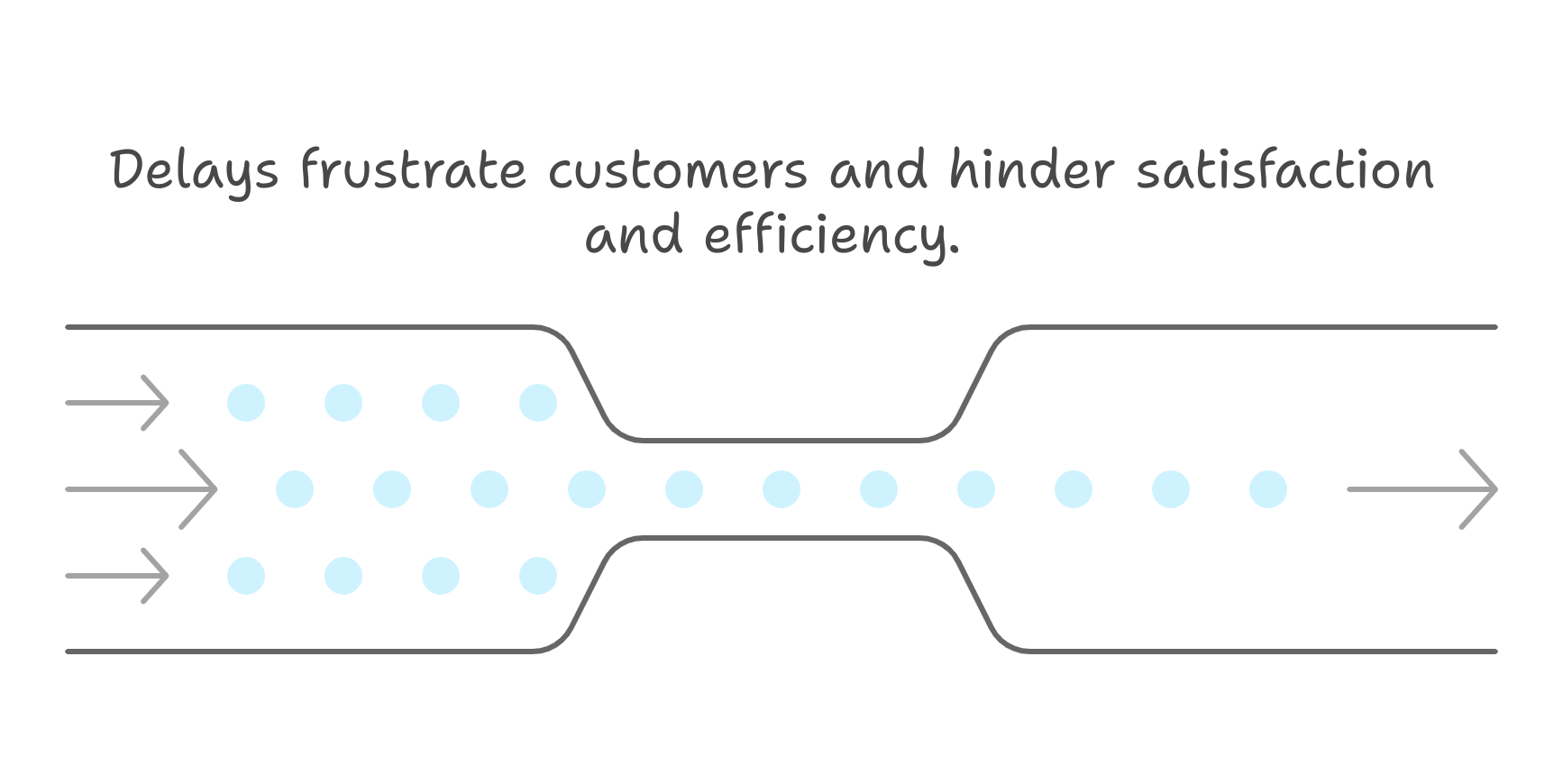The landscape of customer support is shifting, and automation is emerging as a critical player in redefining how companies interact with their clients. It’s not just a trend; it’s a necessity for success in the ever-accelerating marketplace.
Understanding customer support automation is essential to thriving in today’s digital age. From streamlining responses to enhancing overall satisfaction, the tools and strategies associated with automation can revolutionize the customer experience.
As these systems grow in sophistication, so too does the opportunity for businesses to leverage them for competitive advantage.
Join us as we explore the multi-faceted world of customer support automation. We’ll delve into the strategies that pave the way for success, uncovering both the incredible benefits and the potential pitfalls of this powerful technology.
Discover how to effectively integrate automation into your workflow and ensure your team is aligned for maximum impact.
Table of Contents
Understanding Customer Support Automation
Customer support automation is revolutionizing the way businesses enhance customer satisfaction and optimize their customer service teams.
By harnessing AI-powered chatbots, companies can provide instant answers to common questions, thereby eliminating repetitive tasks and reducing human error.
This not only speeds up response time but also allows customer service agents to dedicate their expertise to complex issues that demand a human touch.
Key Benefits of Customer Support Automation:
- 24/7 Availability: Over half of all customers expect round-the-clock support, which automation readily fulfills.
- Enhanced Metrics: By handling time-consuming tasks, automation improves resolution times, boosts CSAT scores, and elevates NPS.
- Data-Driven Insights: Automation collects valuable customer feedback, enabling ongoing refinement of customer interactions.
| Feature | Benefit |
|---|---|
| AI-powered Chatbots | Instant responses |
| Automated Repetitive Tasks | Improved efficiency |
| Historical Data Analysis | Anticipated customer needs |
Customer service automation tools ensure that the customer journey is seamless, maintaining the crucial personal touch through human interactions when necessary.
By bridging the gap between technology and human agents, businesses can forge stronger customer relationships and deliver remarkable experiences.
The Necessity of Automation in Customer Support
Customer support automation is not just an option—it’s a necessity. By streamlining workflows from start to finish, automation drastically reduces repetitive manual tasks, benefitting both customers and employees.

This is especially critical as 75% of online customers expect responses within five minutes. The integration of AI and machine learning allows customer service teams to provide rapid, accurate solutions to common questions and inquiries, elevating customer satisfaction and operational efficiency.
Automated systems such as AI-powered chatbots and self-service portals empower customers to find immediate answers, reducing wait times and enhancing convenience.
These tools not only improve response times but also mitigate human error, enriching the overall customer experience.
Moreover, leveraging data analytics through automation tools unlocks valuable insights. Businesses can refine strategies, improve the customer journey, and bolster customer relationships by understanding customer interactions better.
This leads to superior management of customer issues, fostering a balance between the indispensability of human touch for complex issues and the efficiency of automated solutions.
In transforming customer support with a blend of speed and precision, automation is a powerful ally in meeting and exceeding modern customer expectations.
Benefits of Automation for Businesses
In the bustling marketplace, the benefits of automation for businesses are profound and multifaceted.
Automation not only revolutionizes the way companies operate but also elevates their ability to meet and exceed customer expectations.
By enabling rapid solutions to routine queries and providing self-service options, businesses can achieve quicker resolutions to customer issues.
This gradual evolution towards automation ensures substantial scalability, empowering businesses to grow without proportionately increasing the demand for human staff.
Moreover, with regular automation of customer feedback collection, businesses can proactively refine their support processes, ensuring they stay ahead of competitors in delivering superior service.
Improved Efficiency
Customer Service Automation (CSA) is pivotal in enhancing business efficiency. By automating repetitive inquiries, it liberates customer support agents to focus on more complex tasks and key performance indicators (KPIs), amplifying overall productivity.
Automation accelerates issue resolution by providing swift responses to customer queries, remarkably reducing waiting times.
Utilizing automated customer service software ensures ticket inquiries are managed effectively, preventing issues from slipping through the cracks and fostering improved collaboration within support teams.
Workflow automation further streamlines processes by replacing manual efforts with automated ones, leading to enhanced accuracy and consistency in service operations.
Thanks to AI-powered tools such as chatbots, businesses can offer 24/7 support, extending customer satisfaction beyond traditional office hours.
Reduced Response Times
The clock ticks fast in the customer service world, and reducing response times is crucial for retaining customer loyalty. Implementing customer service automation can slash response times by up to 50%, significantly enhancing customer satisfaction and loyalty.
By automating tasks such as ticket labeling and routing, resolution times improve by up to 77%. Evaluating average first response times is essential for measuring the impact of customer service teams, as these metrics tie directly to crucial revenue indicators like churn and retention rates.
With customer service automation, businesses can provide 24/7 support, perfectly aligning with the expectations of over 50% of customers who demand round-the-clock assistance.
Furthermore, leveraging customer service software helps manage high volumes of queries, relieving support teams from the overwhelming burden of manually addressing each customer email.
Enhanced Customer Satisfaction
Automation acts as a catalyst for soaring customer satisfaction. By automating repetitive tasks, customer support agents can devote their efforts to more complex inquiries, thereby enhancing service quality and customer satisfaction.
McKinsey research suggests that optimizing customer experience through automation can boost revenue growth by 5-10% across various industries, showcasing its favorable impact on business performance.
Automated customer service tools also generate invaluable data and insights, which inform business decisions, enabling companies to continuously refine their services and better cater to customer needs.
By simplifying information access for agents, AI improves overall efficiency, leading to quicker resolutions and greater customer satisfaction.
Moreover, customer support automation guarantees immediate responses and augments the personalization of support, paving the way for a more fulfilling customer experience.
The transformative power of customer support automation holds the promise of redefining businesses’ interactions with their customers.
It marries technology with the innate need for efficiency, precision, and a personal touch, crafting a customer journey that is both responsive and memorable.
Types of Automated Solutions
In the ever-evolving landscape of customer service, automation is no longer just a convenience—it’s a revolution.
Customer support automation harnesses the power of AI-driven chatbots, automated responses, and seamless self-service portals to redefine the customer journey.
These technologies empower businesses to enhance customer interactions, reduce the burden of repetitive tasks on human agents, and elevate the overall customer experience.
With automated solutions, businesses can swiftly address customer inquiries, resolve complex issues, and improve customer satisfaction metrics like Net Promoter Scores (NPS) and Customer Satisfaction (CSAT). Let’s dive into the remarkable world of automated solutions tailored for customer service.
AI Chatbots
AI chatbots are the vanguard of innovation in customer support automation. These smart tools are designed to provide instantaneous answers and real-time updates, taking the pressure off human agents for routine queries.
A shining example is AiseraGPT, which has catapulted the auto-resolution rate of support tickets by an impressive 75%.
This feat not only eases the workload on your customer service team but also empowers them to focus on intricate issues that truly require the human touch.
AI chatbots amplify customer engagement by encouraging self-help, with a staggering 62% of customers preferring these self-service interactions.
By learning from past customer interactions, these chatbots enhance operational efficiency, optimizing ticket routing and answering straightforward questions with ease.
Automated Ticketing Systems
When it comes to managing customer inquiries efficiently, automated ticketing systems are indispensable.
These systems streamline the ticket creation, routing, and resolution processes, ensuring that repetitive tasks are minimized and critical customer issues are prioritized.
By categorizing and sorting tickets according to predefined criteria like issue type and customer priority, they ensure that the customer requests that matter most are addressed swiftly.
Furthermore, these systems foster collaboration within customer service teams by centralizing ticket management and providing constant updates on status changes.
Their advanced analytics capabilities afford invaluable insights into customer issues and support trends, allowing businesses to track and improve response times.
Integrating automated ticketing systems with other tools such as CRMs and knowledge bases further enhances support efficiency.
Self-Service Portals
Self-service portals are the cornerstone of empowering customers by providing an array of resources such as knowledge bases, FAQs, and instructional videos.
These portals encourage customers to solve simple issues independently, significantly reducing the deluge of customer inquiries faced by support teams.
Implementing self-service solutions not only alleviates stress on human service agents but also leads to substantial cost savings by optimizing staffing needs and curbing expenses related to manual tasks.
The real magic lies in enhancing customer satisfaction—greater access to information translates into higher engagement and loyalty levels.
With the integration of AI chatbots, these portals guide customers to precise solutions for specific problems, cementing the personal touch in an automated world.
In conclusion, customer support automation is transforming the way businesses interact with their customers, making processes more efficient and interactions more meaningful.
As automation tools become more sophisticated, companies can look forward to not just meeting but exceeding customer expectations.
These innovations promise not only to enhance the quality of customer relationships but to redefine the very fabric of customer service.
Embrace the automation revolution—integrate these tools into your operations and watch your customer satisfaction soar!
Identifying Opportunities for Automation
In the dynamic world of customer service, identifying opportunities for automation is crucial for enhancing efficiency and elevating customer satisfaction.
By automating repetitive tasks and common questions, businesses can empower their customer service team to focus on complex issues that require the human touch.
This transformation not only improves response times but also reduces human error, creating a more seamless customer journey.
Key Steps in Identifying Opportunities for Automation:
- Engage Support Representatives: Leverage the unique insights of your customer support agents to uncover inefficiencies in existing workflows.
- Analyze Customer Interactions: Study customer inquiries to identify recurring patterns suitable for AI-powered chatbots and automated responses.
- Set Clear Goals: Define specific benchmarks to measure the success of automation initiatives and ensure alignment with business objectives.
- Integrate Across Channels: Implement automation tools consistently across all customer touchpoints to maintain a coherent customer experience.
By thoughtfully integrating automation, businesses can provide 24/7 support, streamline manual customer service tasks, and enhance customer relationships with a balance of technological efficiency and the necessary personal touch.
Integrating the Right Tools into Your Workflow
In today’s fast-paced digital landscape, integrating customer service automation tools with CRM, help desk, and communication platforms is crucial for creating a seamless flow of information and ensuring personalized interactions.
This integration propels automated workflows, dramatically speeding up processes and reducing human errors by eliminating manual tasks. Such efficiency enhances customer satisfaction and elevates the overall customer journey.
By leveraging intelligent helpdesk technology, companies can automate essential tasks like ticketing and routing, which not only improves service quality but also slashes operational costs.
A strategic focus on incorporating the most commonly used applications—CRM systems and communication platforms—into the customer support ecosystem results in a more streamlined process, fostering consistent service across multiple channels.
Key Benefits of Integration:
- Reduced Error Rates: Automated workflows significantly minimize human error.
- Improved Service Quality: Consistency in service across channels boosts customer satisfaction.
- Cost Efficiency: Lower operational costs with automated repetitive tasks.
Adopting an integrated model is essential for automating repetitive customer service tasks.
This holistic approach not only invigorates customer interactions but also enriches customer relationships by providing a consistent and tailored customer experience with a personal touch.
Ensuring Alignment Across Your Team
In the dynamic world of customer service, embracing customer support automation is not just beneficial—it’s essential. To effectively harness the power of automation, it’s vital to ensure your customer service team is perfectly aligned with the new processes.
Training is key. Ensuring that your team members are adept with customer service automation tools empowers them to elevate the customer experience.
A clear delineation of responsibilities is crucial. Team members must be adept at handling escalated customer service tickets swiftly, addressing complex issues and enhancing customer satisfaction. This clarity fosters quicker resolutions to everyday customer inquiries.
Here’s a quick checklist to ensure alignment:
- Training: Equip your team with the skills to use automation tools effectively.
- Responsibilities: Clearly outline each member’s role in managing and maintaining tools.
- Feedback: Encourage open dialogue for continuous improvement.
- Point of Contact: Establish clear contacts for system questions and fixes.
This alignment is not just about technology—it’s about enhancing human interactions. By encouraging feedback and maintaining clear communication, your team becomes not just proficient with AI-powered systems but also deeply connected with customer needs, blending the personal touch with technological efficiency.
Monitoring Performance of Automated Systems
In the ever-evolving landscape of customer support automation, continuous monitoring and improvement are the cornerstones of maintaining system effectiveness and enhancing customer satisfaction.
Regularly reviewing performance metrics such as response times, resolution rates, and CSAT scores is key to fine-tuning automation rules, ensuring your customer service team continues to delight your audience.
To guarantee success, conducting pilot programs is imperative. These tests help identify potential issues and highlight areas for improvement before full-scale deployment, minimizing disruptions and maximizing efficiency.
Automated systems not only streamline customer inquiries but also provide robust reporting and analytics capabilities. This wealth of data allows businesses to refine strategies based on valuable insights, facilitating an upward trajectory in performance.
A proactive approach to data collection from customer interactions ensures that AI-powered chatbots and automated customer service tools learn and adapt continually.
By addressing gaps in service and understanding customer feedback, companies can maintain the personal touch necessary for a superior customer experience.
Key Monitoring Areas:
- Response Time
- Resolution Rate
- Customer Satisfaction (CSAT)
- Customer Feedback
These efforts culminate in a seamless blend of human touch and automation, elevating customer relationships to new heights of excellence.
Gathering Customer Feedback for Continuous Improvement
In the quest for superior customer support automation, actively collecting customer feedback stands as a cornerstone for continuous improvement.
By employing various methods—surveys, questionnaires, and online reviews—businesses can pinpoint areas ripe for enhancement in their automated workflows.
Monitoring this feedback, and responding to suggestions, allows for agile adjustments in customer support processes, propelling a remarkable customer experience.
Automated post-interaction feedback tools, like customer surveys, not only gauge satisfaction but also harvest valuable insights for perpetual optimization.
Engaging clients through feedback forms and social media platforms invites constructive recommendations, ensuring automated systems resonate with evolving customer needs.
A crucial element in this pursuit is integrating customer feedback into the optimization process. Below is a list that highlights the steps for leveraging feedback:
- Collect feedback through multiple channels.
- Analyze data to uncover improvement areas.
- Implement changes based on insights.
- Monitor results and refine strategies.
By harmonizing automation solutions with customer insights, businesses can sustain high customer satisfaction rates, strengthening customer relationships and ensuring the personal touch they deserve.
Pros of Customer Support Automation
In the dynamic world of customer service, automation is revolutionizing how support teams operate, elevating both customer and employee experiences.
By automating repetitive tasks and streamlining workflows, customer support automation empowers teams to concentrate on complex issues that require a human touch and expertise, thereby enhancing customer satisfaction.
Integrating CRM data with automation tools allows for precise, targeted email responses, improving communication when email serves as the primary channel.
Proactive support automation keeps customers engaged by delivering timely, relevant messages that promote seamless user journey continuity and self-service options.
One of the most significant advantages is the 24/7 availability, drastically reducing response times and letting customers receive immediate support without long waits.
Automated systems excel in utilizing data to drive AI-powered interactions, enabling teams to swiftly address customer inquiries, detect service gaps, and decrease human error.
Key Benefits of Customer Support Automation:
- Streamlines repetitive tasks
- Enhances 24/7 support capabilities
- Improves targeted email communication
- Promotes proactive customer engagement
- Reduces response time and human error
By embracing automation, businesses can refine the customer journey, improve customer relationships, and increase overall efficiency in handling customer requests, ensuring a superior customer experience.
Case Studies: Successful Implementation of Automation
Customer support automation isn’t just a trend; it is revolutionizing the customer service landscape. By optimizing operations, companies are witnessing spectacular improvements in efficiency and customer satisfaction. Here are key elements observed in successful implementations:
1. Enhanced Efficiency:
- Automation tools handle repetitive tasks with precision, reducing manual effort and human error.
- Tasks like data entry and status updates transform into seamless, error-free processes.
2. Improved Customer Experience:
- AI-powered systems tackle common questions, freeing up human agents to add the human touch to complex issues.
- This ensures faster response times and empowers agents to deepen customer relationships.
3. Team Engagement and Feedback:
- Essential to success is aligning the customer service team with new technologies.
- Training programs and team feedback loops guarantee smooth transitions and effective knowledge bases.
| Key Elements | Outcomes |
|---|---|
| Repetitive Tasks | Reduced errors, faster processes |
| Complex Issues | More time for personal interactions |
| Customer Satisfaction | Enhanced due to quicker response times |
Through pilot programs and testing processes, companies validate automation tools in real-world situations, ensuring reliability and adaptability.
These cases illustrate how strategically implemented automation leads to empowered companies and elevated customer journeys.
Future Trends in Customer Support Automation
The future of customer support automation is brimming with endless possibilities, driven by AI-powered chatbots and intelligent customer service automation.
As the pressure for rapid response times intensifies, with 75% of customers expecting help in under five minutes, businesses must transform to meet these expectations.
Key Innovations:
- AI-Driven Interactions: Elevates speed and accessibility, creating an AI-enhanced customer experience.
- Automated Ticketing & Intelligent Routing: Slashes ticket backlogs and minimizes frustration by ensuring issues reach the right expert without delay.
- Self-Service Portals: Empower customers to resolve common questions independently, leading to reduced human agent dependency and lower operational costs.
However, it’s crucial to maintain a balance, blending automated solutions with the irreplaceable human touch. While automation increases scalability and efficiency, integrating human interactions ensures that every customer journey feels personal.
This seamless combination enriches customer satisfaction and bolsters customer relationships.
| Feature | Benefit |
|---|---|
| AI-Powered Chatbots | Speed and accessibility in interactions |
| Automated Ticketing | Reduced ticket backlogs |
| Self-Service Portals | Lower operational costs |
Embrace this automated future, where cutting-edge technology meets the unparalleled value of human empathy, setting the stage for unparalleled customer experiences.
Conclusion and Key Takeaways
In conclusion, customer support automation is revolutionizing how businesses interact with their customers.
Leveraging AI-driven technologies such as chatbots and self-service tools provides immediate responses to common questions, streamlining service delivery and enhancing customer satisfaction.
By integrating these solutions, organizations can refocus their customer service teams on complex issues that require a human touch, moving away from repetitive tasks and reducing human error.
Key Takeaways:
- Streamlined Operations: Automation simplifies workflows, allowing customer support agents to concentrate on higher-level problem-solving and nurturing customer relationships.
- Enhanced Customer Experience: With omnichannel support, the customer journey becomes seamless and consistent, vital for customer loyalty.
- Empowerment Through Self-Service: Customers can independently resolve inquiries, decreasing dependency on human agents and minimizing response time.
- Future Trend: The pivot towards AI-powered chatbots and self-service platforms marks a shift from traditional methods, emphasizing efficiency in handling customer interactions and issues.
Incorporating automation is not just about reducing manual tasks; it’s about transforming the entire customer service landscape for an improved, more engaging customer experience.





